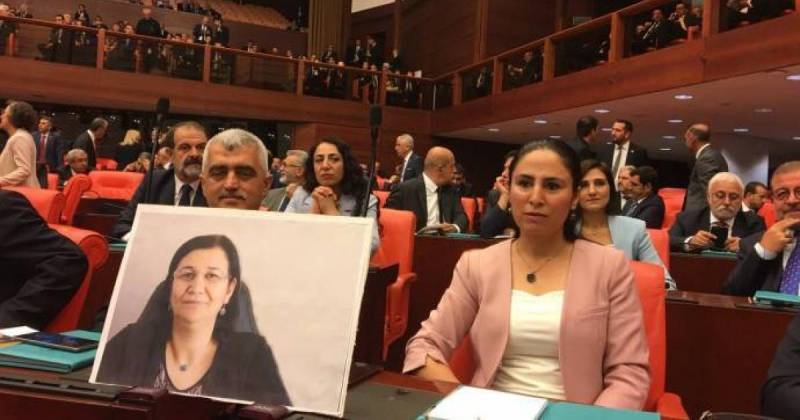Leyla Güven has been in prison since January, accused of criticising the Turkish military offensive against the Syrian Kurdish district of Afrin. From behind bars she was elected as member of parliament for Turkey’s pro-Kurdish opposition Peoples’ Democratic Party (HDP) in the June 24 general elections.
On June 29, a court decided to release her since she her parliamentary seat meant she had been granted her immunity from prosecution. But the same day, prosecutors appealed the decision and she was denied release.
Just as in the case of other Kurdish politicians, Güven was arrested on one charge, and then many other accusations were added to the lawsuit.
So why is Güven in prison?
According to the indictment prepared after her arrest, Güven is charged with being the co-chair of the Democratic Society Congress (DTK), an umbrella group of the Kurdish political movement, which it defines as an illegal organisation.
The DTK was once invited to the office of the parliamentary speaker to present its views. There are many non-governmental organisations within the DTK, and many members of parliament, politicians, as well as ambassadors have participated in its meetings.
As the political environment has changed in the last two years, the government has begun a crackdown on the DTK. Güven is accused of supporting a terrorist organisation as she demanded “democratic confederalism” in a speech, the form of rule advocated by the banned Kurdistan Workers’ Party (PKK).
During the now-dead peace process with the PKK in 2013, President Recep Tayyip Erdoğan told CNN Turk: “There is no fear of confederalism in the developed countries of the world. There was the state of Lazistan in the mighty Ottoman Empire. There was the state of Kurdistan. Even the confederal system should be discussed if necessary for lasting social peace and solution.”
In a second indictment, Güven was charged with membership of a terrorist organisation on account to seven different activities. These activities include participating in a hunger strike, a commemoration and Kurdish Women’s Workshop, giving a speech to an HDP congress, a speech at a meeting of the pro-Kurdish Democratic Regions Party (DBP) and criticising Turkey’s offensive this year against the Syrian Kurdish district of Afrin.
But all of these political activities are legal and her speeches were public. For example, sing the word Kurdistan was designated an offence in the indictment.
But again, Erdoğan used the word Kurdistan in a speech in 2013, as have many politicians from his party.
Güven gave a speech in only in three of the seven political activities listed in the indictment, at the other four she did not even speak, she just attended the events.
In short, Güven, a member of parliament, has been charged with membership of a terrorist organisation and has been kept behind bars for nine months, based on speeches, the words she used in press statements and events attended. But members of the ruling party who used the same words are still in the parliament.
On July 26, news reports said Güven had received a one-month disciplinary punishment after the prison administration interpreted a song she sang with a friend as an illegal anthem.
This reminds us of Kurdish writer Musa Anter who was punished for whistling a Kurdish song in 1943. Seventy-five years later, Leyla Güven is being punished for singing in Kurdish. It hurts to see the state going nowhere in 75 years.
So why is Güven kept in prison? To answer this question, it is necessary to know her. Güven is one of the most important female politicians of the Kurdish movement. She is a woman of her word, diligent, and gives hope and confidence to the Kurdish people.
She is a powerbroker within the Kurdish community. She is more than just a politician.
Of course, the government knows this fact. That is why it is trying to keep this extraordinary woman behind bars. But the government is mistaken. I think, even if Güven is behind bars, her songs and laughter reach us.
I met again with Güven’s attorney Reyhan Yalçındağ Baydemir and asked whether the decision to release Enis Berberoğlu, a member of parliament for the main opposition party would serve as a model in Güven’s case. Berberoğlu was initially sentenced to five years and 10 months in 2017 for espionage for providing a newspaper with a video purporting to show Turkey’s intelligence agency trucking weapons into Syria. The court upheld the conviction and the jail term on Sept. 20, but ruled that Berberoğlu be released until the end of his parliamentary term.
Güven’s lawyer told me that after Berberoğlu’s release, she immediately applied to the court for her client to be freed, but had not received an answer.
Turkey’s judiciary is once again being tested for its commitment to the rule of law. Let us hope the court gives a good account of itself.
